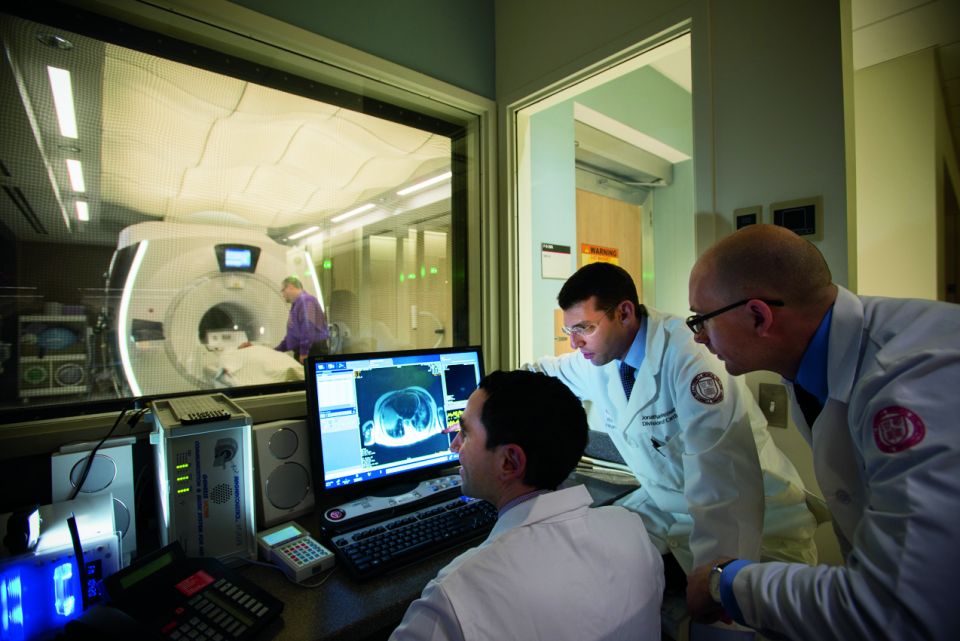Cardiac CT and MRI
Advances in imaging technology are leading to incredible developments in the diagnosis of cardiac artery diseases. Here at Weill Cornell Medicine, our physicians use state-of-the-art CT (computed tomography) and MRI (magnetic resonance imaging) technology. CT and MRI are highly effective procedures for visualizing the heart and helping doctors understand your heart’s health. Both methods are non-invasive and do not require anesthesia.
Our program works closely with Weill Cornell Imaging at NewYork-Presbyterian offering comprehensive consultation with world-class radiologists with expertise in the full array of diagnostic imaging examinations and facilities featuring the most advanced imaging technology, managed by highly trained radiology technologists and nurses who focus on quality and patient safety ensuring the lowest possible radiation dose for every patient.
Cardiac Computed Tomography (CT)
Cardiac computed tomography (CT) technology directly images coronary arteries and identifies arterial blockages that would otherwise only be diagnosed using invasive testing. Cardiac CT imaging may also be used to assess patients' future risk of developing cardiovascular disease.
Cardiac CT scans use x-rays and a computer to create high quality images of the heart, its vessels, and other structures in the chest. This safe, painless test is useful for examining the anatomy of the coronary arteries, cardiac chambers, and blood vessels in the chest. The images produced by a CT scan can be used to detect blockages in the coronary arteries, blood clots in the heart's chambers, aortic aneurysms, and cardiac tumors.
Cardiac CT scans can also be used to examine the heart and its vessels for calcium deposits, called calcium scoring. Because calcium deposits occur at sites of atherosclerosis, their presence and their size are indicative of the risk of cardiovascular disease: the more extensive the deposit, the greater the risk.
For more information about your CT exam visit: Computed Tomography (CT) | Weill Cornell Imaging at NewYork-Presbyterian
Cardiac Magnetic Resonance Imaging (MRI)
Cardiac magnetic resonance imaging (MRI) is a diagnostic procedure that uses a combination of a large magnet, radio frequencies, and a computer to produce detailed still and moving images of the heart. This non-invasive, safe method scans the body to produce information on the anatomy of the heart and its vessels, as well as moving images of the heart as it is beating. This enables physicians to detect abnormalities in the heart's chambers, irregularities in the flow of blood through the heart, and abnormalities of the cardiovascular system, including cardiac tumors, disease of cardiac valves, cardiac hypertrophy (enlarged heart), and others.
At Weill Cornell Medicine, we offer state-of-the-art cardiac MRI imaging that can reveal areas of heart tissue that have been damaged by myocardial infarction (heart attack) and regions that are not receiving an adequate blood supply. MRI can also assess the heart muscle for signs of conditions, such as genetic or acquired cardiomyopathies, or if the heart is affected by other conditions, such as an autoimmune condition.
For more information about your MRI exam visit: Magnetic Resonance Imaging (MRI) | Weill Cornell Imaging at NewYork-Presbyterian
Request an Appointment
If you are a Weill Cornell Medicine (WCM) patient and a CT or MRI exam has been ordered for you, you will receive a link to schedule online.
If you are not a WCM patient, request an appointment by securely uploading your prescription or calling (212) 746-6000 and have your referring physician fill out the appropriate referral form - Referral Forms | Weill Cornell Imaging at NewYork-Presbyterian
Our Physicians
| Faculty | Title | Phone | ||
|---|---|---|---|---|
 |
Jonathan W. Weinsaft, M.D. |
Chief, Greenberg Division of Cardiology, A.M. Gotto Professor of Medicine, Atherosclerosis and Lipid Research | 646-962-5558 | Full Profile |
 |
Jiwon Kim, M.D. |
Associate Professor of Medicine, Director, Cardiovascular Imaging Program | 646-962-4733 | Full Profile |
 |
Quynh A. Truong, M.D., M.P.H. |
Professor of Radiology | 212-746-6000 | Full Profile |
 |
Robert Zhang, M.D. |
Assistant Professor of Medicine | 646-962-5558 | Full Profile |



